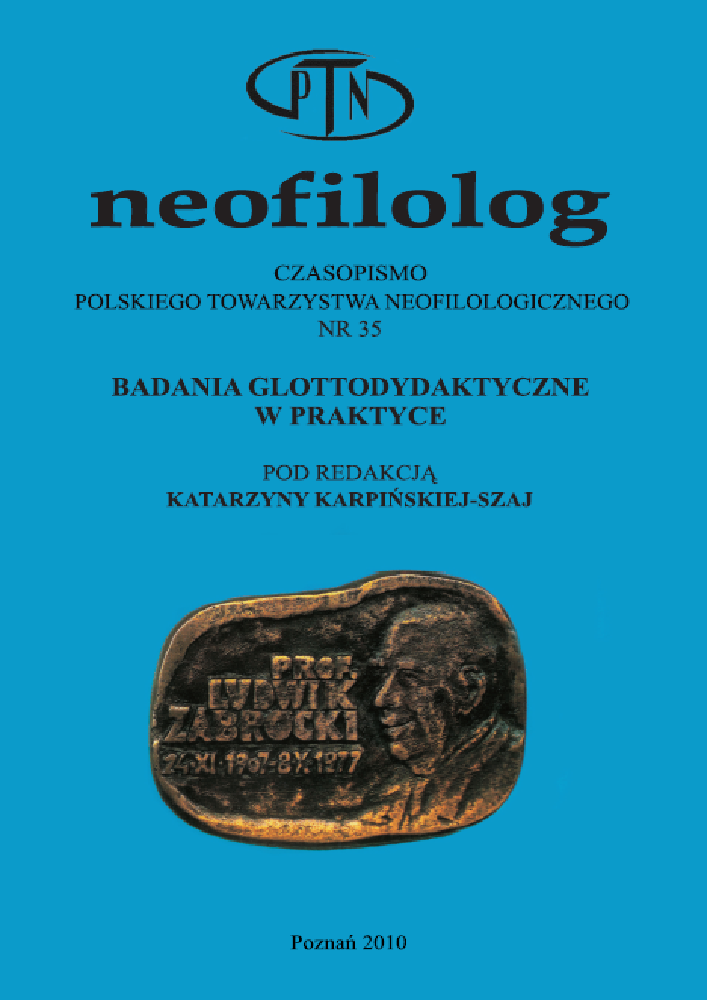Abstract
In traditional classrooms, where students are evaluated on the basis of their actions, poor performance is closely linked to the lack of ability. Many students often see failure as a threat to their positive self-image and instead of increasing efforts, apply various ego-protective strategies to shift attention from real or hypothesized lack of ability to other factors influencing unsatisfactory production. In both cases self-worth is protected. This paper aims at performing a motivational analysis of two such strategies, i.e. self-handicapping and defensive pessimism used by secondary school students in achievement context.
References
Berglas, S. i E.E. Jones. 1978. „Drug Choice as Self-Handicapping Strategy in Response to Success.” Journal of Personality and Social Psychology 36: 405-417.
Buss, D.M. i N. Cantor (red.). 1989. „Personality Psychology: Recent Trends and Emerging Directions”. New York: Springer-Verlag. 115-127
Covington, M. 1992. Making the grade. New York: Cambridge University Press.
Dweck, C.S. 1986. „Motivational processes affecting learning.” American Psychologist 41: 1040-1048.
Elliot, A.J. i M.A. Church. 2003. „A Motivational Analysis of Defensive Pessimism and Self-Handicapping.” Journal of Personality 71: 369-396.
Feick, D.L. i F. Rhodewalt. 1997. „The double-edged sword of self-handicapping: Discounting, augmentation, and the protection and enhancement of self-esteem.” Motivation and Emotion, 21: 147-163.
Jones, E.E. i F. Rhodewalt. 1982. The Self-Handicapping Scale. Princeton University.
Martin, A., H., Marsh, i R. Debus. 2001. „Self-handicapping and defensive pessimism: Exploring a model of predictors and outcomes from a self-protection perspective.” Journal of Educational Psychology, 93: 87-102.
Martin, A.J., H.W. Marsh, A. Williamson i R.L. Debus. 2003. „Self-handicapping, defensive pessimism, and goal orientation: A qualitative study of university students.” Journal of Educational Psychology 95: 617-628.
Norem, J.K. i N. Cantor. 1986. „Defensive pessimism: Harnessing anxiety as motivation.” Journal of Personality and Social Psychology 51: 1208-1217.
Norem, J.K. i K.S.S. Illingworth. 1993. „Strategy-dependent effects of reflecting on self and tasks: Some implications of optimism and defensive pessimism.” Journal of Personality and Social Psychology 65: 822-835.
Norem, J.K. 2001. „Defensive pessimism, optimism, and pessimism.” (w) Optimism & pessimism: Implications for theory, research, and practice. (red.) E.C. Chang Washington: American Psychological Association.
Showers, C. 1992. „The motivational and emotional consequences of considering positive or negative possibilities for an upcoming event.” Journal of Personality and Social Psychology, 63: 474-483.
Shepperd, J. i R. Arkin. 1998. „Determinants of self-handicapping: Task importance and effects of pre-existing handicaps on self-generated handicaps.” Personality and Social Psychology Bulletin, 15: 101-112.
Snyder, C.R., T.W. Smith, R.W. Augelli i R.E. Ingram. 1985. „On the self-serving function of social anxiety: Shyness as a self-handicapping strategy.” Journal of Personality and Social Psychology, 48: 970-980.
Urdan, T. i C. Midgley. 2001. „Academic self-handicapping: What we know, what more there is to learn.” Educational Psychology Review, 13: 115-138.
License
Copyright (c) 2010 Aleksandra Więckowska

This work is licensed under a Creative Commons Attribution-NoDerivatives 4.0 International License.
Authors
Authors of texts accepted for publication in Neofilolog are required to complete, sign and return to the Editorial team’s office the Agreement for granting a royalty-free license to works with a commitment to grant a CC sub-license.
Under the agreement, the authors of the texts published in Neofilolog grant Adam Mickiewicz University in Poznań a non-exclusive, royalty-free license and authorize the use of Attribution-NoDerivatives 4.0 International (CC BY-ND 4.0) Creative Commons sub-license.
The authors retain the right to the free disposal of the work.
Users
Interested Internet users are entitled to use works that have been published in Neofilolog since 2017, under the following conditions:
▪ attribution – obligation to provide, together with the distributed work, information about the authorship, title, source (link to the original work, DOI) and the license itself.
▪ no derivatives – the work must be preserved in its original form. Without the author's consent, it is not possible to distribute the modified work in the form of translations, publications, etc.
Copyrights are reserved for all texts published since 2017.
Miscellaneous
Adam Mickiewicz University in Poznań retains the property right as a whole (layout, graphic form, title, cover design, logo etc.).
